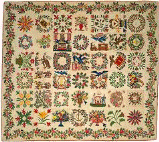Textile Society of America

Textile Society of America: Symposium Proceedings
Date of this Version
2002
Document Type
Article
Citation
Published in Silk Roads, Other Roads: Textile Society of America 8th Biennial Symposium, Sept. 26–28, 2002, Smith College, Northampton, Massachusetts.
Abstract
I am an artist who has a strong interest in color theory and theories of perception and I have the power to weave my own canvas. I want to emphasize the importance for me of the study of textile history, and the privilege of viewing museum collections. Although I began weaving with silk, now 1 literally weave painter's linen canvas similar to the sort that can be purchased from artists' materials suppliers. Formally, the work explores optical aspects of vision and nuances of value contrast. Ikat and weave structure give special effects. Ikat technique, dyeing and painting the yarn before weaving, enables color and image to be embedded in the woven structure and locked inside the canvas. Color reflects light differently depending on whether it is placed in the warp or weft. The representation of space occurs through color overlay. There is a play of edge, hard and feathered.
From a current perspective, my work examines and reinterprets minimalism in the context of textile imagery. Some of my silk pieces use images of kasuri, greatly enlarged. Another was inspired by an Indonesian textile. 1 switched to linen as a comment on the materials of art, referencing the 16th century transition from images realized in fresco or on wood to painting on fabric (oil on linen). One image was taken from the log cabin quilt and used the color weave sequence that weavers call "log cabin". Other works use the image and weave structure of the telia rumal, the tartan or denim.


Comments
Copyright 2002 by the author(s). Used by permission of TSA.